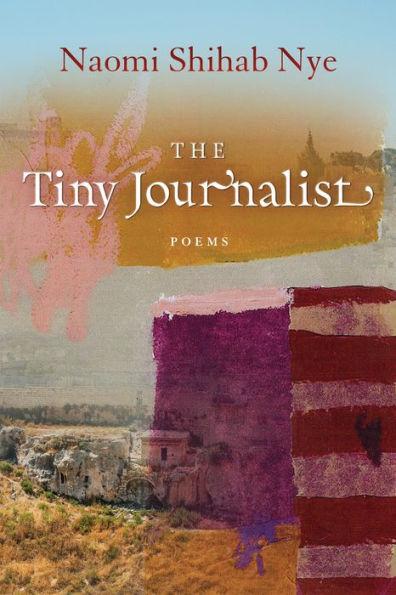
Poetry
Naomi Shihab Nye
The Tiny Journalist (American Poets Continuum Series)
BOA Editions Ltd.
Hardcover, 978-1-9426-8372-8, (also available in paperback and as an e-book), 128 pgs., $24
April 16, 2019
With a wide-angle lens taking in the tumultuous landscape that braids the personal and the political, the land and the language, and the kind child she insists is in every one of us, National Book Award Finalist, poet, and Texas treasure, Naomi Shihab Nye writes “only children / would ever find the key.” Dedicated to Janna Jihad Ayyad (born 2006), who at seven years old began reporting injustices in her village on the West Bank of Palestine, The Tiny Journalist sings to chronicle Janna’s journey in clear, concise, and cutting free verse.
Nye admits joining Facebook just so she could follow Janna, writing that these poems “are ‘my’ words, imagining Janna’s circumstances.” In the first section of the book, we meet the journalist through several persona poems: “We would like the babies not to find out about/ the failures waiting for them,” the checkpoints, the “bulldozers/ crushing houses/schoolrooms,” never knowing “what it would feel like, not having guns pointed at us.”
Because of her own experience in Palestine during the late sixties, Nye mines her own childhood memories of the beauty she misses with interspersed offerings of mint, fig pencils, and lemons to help place the reader both in the scene and in the honest clarity of a child’s obvious questions, rendering intense emotional weight: “When Facebook says I have “followers”—/ I hope they know I need their help,” by telling Netanyahu, “You don’t need a stethoscope/ to imagine a heartbeat.” She worries about little-known human rights cases, making us question if we are complicit: “We should all be concerned about Mohammed Zayed,//No details on his new arrest.”
In the second section of the book, the adult voice appears, interlacing pastoral scenes from Syria, Yemen, Guangzhou, Wales, Australia, Qatar, and many others places while including global reactions to the U.S. 2016 election: “an Australian librarian / would pass me a note, WTF?” Attentive to language, wholeness, and hope, these poems also redefine the scope of empty and politicized words. One poem alerts the reader: “You Are Your Own State Department.” “Each day,” a girl assures the speaker,” slip[s] its blank visa into our hands.” We learn that “superpower” is the gift of “retaining imagination/ in worse days.”
In this chorus of speakers blended with her own voice, Nye includes much needed encouragement for a person like Janna, who is willing to take a stand in the voice of an old journalist: “I see you stand, hands up, saying/ Move back! to the ones with guns./ This was never easy for me to do.” Reminding the reader that all Palestinians are “also Semites” and that being “pro-justice for Palestinians is never an anti-Semitic position,” this poet delivers news-worthy journalistic headlines of her own about those who have lived through the occupation, recounting that “we had to become heroes to survive at all.” If only we knew all of those stories.
This book is more than a book of poems. It is a call for awakening.
Naomi Shihab Nye was born in St. Louis, Missouri. Her father was a Palestinian refugee and her mother an American of German and Swiss descent, and Nye spent her adolescence in both Jerusalem and San Antonio, Texas. She earned her BA from Trinity University in San Antonio. Nye is the recipient of numerous honors and awards for her work, including a Lavan Award, the Paterson Poetry Prize, the Carity Randall Prize, the Isabella Gardner Poetry Award, the Lee Bennett Hopkins Poetry award, the Robert Creeley Prize, and many Pushcart Prizes. She has received fellowships from the Lannan Foundation, the Guggenheim Foundation, and she was a Witter Bynner Fellow. From 2010 to 2015 she served as a Chancellor of the Academy of American Poets. In 2019 she was awarded the Lon Tinkle Award for Lifetime Achievement from the Texas Institute of Letters.
